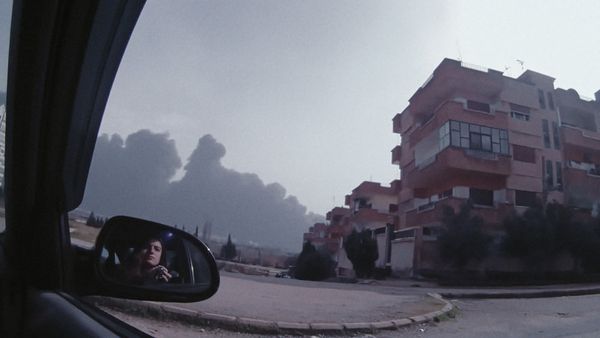Eye For Film >> Movies >> 5 Seasons Of Revolution (2023) Film Review
5 Seasons Of Revolution
Reviewed by: Amber Wilkinson

The ongoing nature of the strife in Syria is indicated by the title of this intensely personal documentary from Lina - a journalist who uses only this first name along with a string of other identities in order to protect her safety and that of others. As well as travelling to hotspot areas that have been previously well-documented, like Homs and Aleppo, she also turned her camera on herself and her friends – Malaz, Susu, Rima, and Bassel – in Damascus as they navigated their lives under the shadow of war between 2011 and 2015.
In terms of the usual trappings of conflict - the bombings, killings and the like - Damascus is comparatively unscathed, but Lina captures the constant tension of a young, comparatively well educated and wealthy generation trying to orchestrate protests and revolution from their apartments.

What this means for her friendship group isn’t immediately apparent but grows through the film. They may not be facing a daily bombardment from the skies but what they are doing is every bit as risky - taking to the streets in protest in the knowledge that Assad’s dictatorship could scoop them up at any moment. Although this is a risk they are all prepared to take - and one that Lina notes is lessened to a degree by a social status which means the regime doesn’t view her as a threat - it takes its toll, not just on them personally but their group spirit. The fragmentation of the country, as it’s torn by opposing forces, becomes apparent as differences of approach emerge as the viewpoints of the friends shift. Her footage allows us to feel the slow grind of a regime that will stop at nothing to oppress its populace.
There may be a level of privilege but there’s an incredible amount of bravery here, as the friends continue their non-violent protests in the face of incarceration and torture at the hands of the state. Lina’s filmmaking has a raw emotional quality and she’s able to retain the intimacy of the film while protecting the identity of one of the participants via the use of the sort of deepfake technology previously used to similarly good effect in Welcome To Chechnya. We also see, in real time, how talking with those on the frontline and watching her friends be traumatised or forced to flee by their own government, leads Lina to question what is the best way forward for all of them.
Through it all there’s an implicit question for the viewer too, about the position of the rest of the world, apparently happy to be a bystander as their fight goes on.
Reviewed on: 31 Mar 2023














